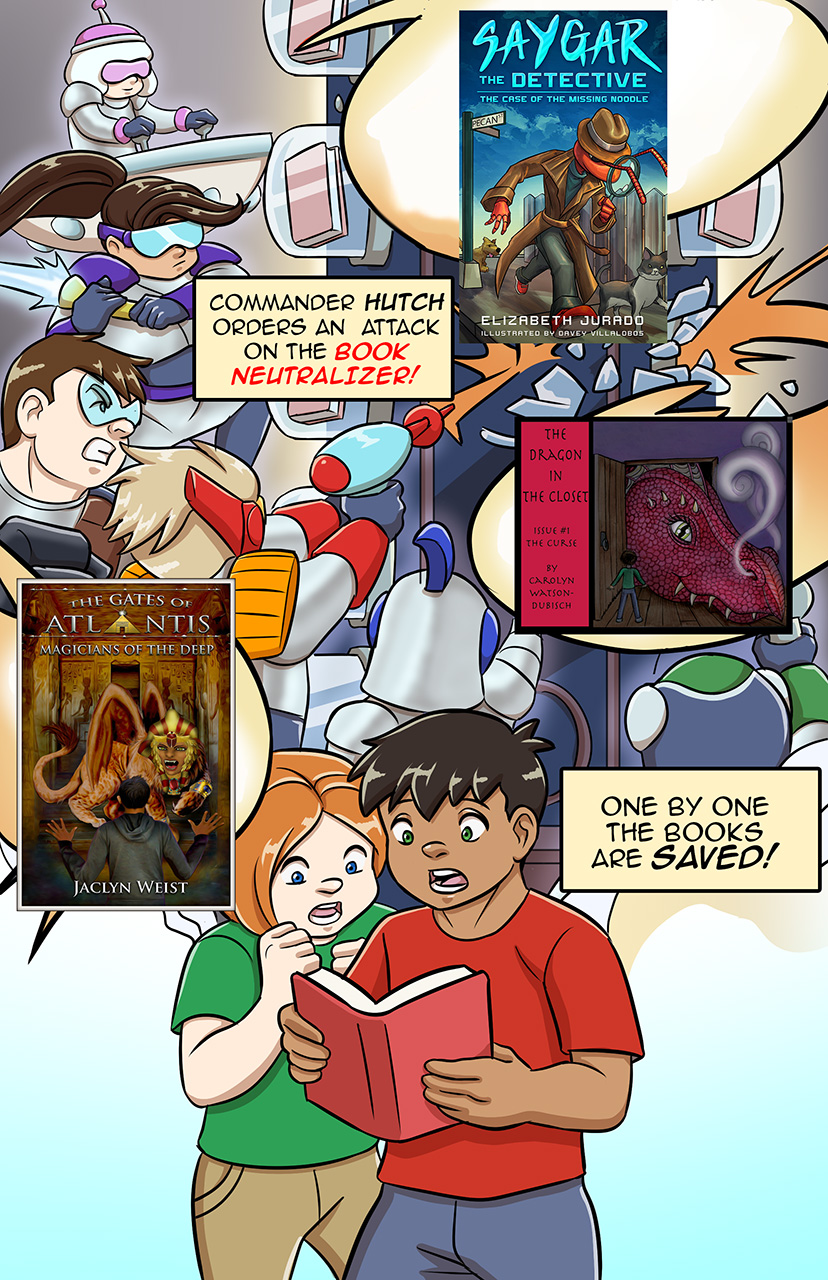
Six girls formed a hastily organized phalanx outside the underground wooden door, each variously armed with shovels, a trowel, a broom and a barrel lid. A torch burned in the formerly empty sconce, filling the chamber with flickering orange light. The glow from Jessica’s ring added enough brightness to make it possible for Ranko to pick out details around the door handle.
“I think I can open it with this,” she whispered.
“Why?” Shannon replied, keeping her voice as quiet as possible.
“Because then I won’t get zapped by a poison dart!”
“There’s poison darts?!”
“Shhh!”
“Okay, go,” Alanna said.
Ranko stood as far back as she could and gingerly tried to work the door handle with her purloined stick-weapon. After a few slips and misses, she finally planted one end against the mechanism and caused it to click loose. No poison darts. The door opened just far enough to see the next chamber was also well-lit.
“Now what?” Shannon whispered.
“We charge in there and whack ’em over the head.”
“Ranko–” Jessica chided.
“Okay, we challenge them to duels one by one. Does anyone speak deranged gnome?” Ranko looked in Talitha’s direction. Talitha noticed and blushed.
“Let’s just be careful,” Alanna said. Ranko worked the door open a little more. The chamber was empty. The creatures had even left their bag behind. The floor was covered by what looked like worn out animal skins. There were several half-empty wooden boxes of supplies. Some of the food looked spoiled. Another torch burned at the opposite end of the chamber.
Ranko and Alanna carefully made their way inside looking the chamber up and down for anything potentially dangerous. They noticed another open exit with no door at the far end. It was partially hidden by some of the stacked boxes. The narrow passage extended beyond the torchlight and into darkness.
“They escaped,” Ranko said.
Alanna tested the leather bag with her farm implement. She could hear the metallic shuffle of coins. “More treasure?” She poured the contents out. A pile of copper coins clattered over the animal skin rugs, rolling and bouncing around.
“Wow! How many are there?” Cici asked.
“Looks like a lot,” Shannon said. “I wonder where they got them? Some are little and some are bigger like before.”
“Yeah, but where did they go?” Ranko asked. “That tunnel looks too small for us to crawl through. Might even be too small for them.”
The sound of a door closing echoed. Six girls stared at each other silently as slow, heavy footsteps approached.
“Go! Go!” Shannon whispered. Five girls hurried back out the door with their improvised weapons, leaving the empty bag and the coins. It wasn’t until they were outside they noticed Jessica had remained.
“Jessica! Come on!” Ranko whispered urgently. A raspy wheezing sound was coming from the open passageway now. Finally, a creature considerably larger than the strange little goblins emerged. It was much fatter and wore colorful beads around its leather tunic. From its back sprouted leathery wings with black barbs. Its face twisted into a teeth-bared snarl when it saw Jessica standing over the abandoned coins. It crawled over the boxes with a menacing glint in its black eyes.
“Why did you steal these?” Jessica asked, as if expecting an answer. The other girls stood in open-mouthed shock, watching. The creature hesitated as the golden glow in the chamber began to intensify. Finally its weight settled on its bulbous feet and it grinned malevolently. It’s scaled claws burst into flame.
By now the glow was almost too bright to see what was happening. Light streamed through the doorway, sharply casting the girls’ shadows on the far wall. Once again, Ranko had the clearest view. She held her breath as the winged goblin chief raised its fiery hands towards her friend.
Ranko could see Jessica was holding a golden sword. A light like the sunrise beamed just before bolts of orange fire shot from the huge goblin’s fingers and exploded against Jessica’s blade. Magical fire deflected in all directions. The boxes and debris exploded. Flames were everywhere. An inhuman roar echoed through the tunnels.
It didn’t take long for the fires to diminish. Jessica stood wide-eyed and gasping for air. She was holding her hands up in a “stop” gesture. There was a light sheen of perspiration on her face and her hair looked like it had been blown back by a gale force wind. The sword and creature were both gone. Dawnsong was back on her hand.
“Jessie?” Shannon asked gently, leaning forward to see if the shorter girl was hurt.
The blond girl looked at her hands again absently. Her friends gathered around.
“What did I doooo?”
“Okay, I’m not saying you just did the most awesome thing I’ve ever seen, but you just did the most awesome thing I’ve ever seen!” Ranko said, watching Jessica’s face carefully to make sure she was okay.
“What was that creature?” Alanna asked.
“Looked to me like one of those green bugbears ate all the others and then shot a fireball at us,” Shannon replied. “Yuck!”
“And they left all the money!” Cici announced as she started grabbing handfuls of copper coins and shoving them back in the bag like an 11-year-old bank robber.
By now Ranko had taken Jessica by the shoulders. She was examining her friend’s astonished face closely. “Hey! Goofy!” Ranko shook her. “Wake up!”
“Are you all okaaaay?” Jessica asked in a dreamy voice.
“Yeah. We’re fine.” Ranko glanced at the others. “How are you, sword girl?”
Jessica smiled, even though she looked and sounded exhausted. “I’m okaaaay.” Her voice trailed off. “I’m going to go over here… and just rest a little.” Jessica knelt and then crawled to a spot near a wooden post reinforcing the dry mud wall.
Ranko looked at Alanna and the others with a concerned expression. By the time she looked back Jessica was asleep.
“What is going on?” Ranko whispered. Talitha knelt and examined her friend. Jessica didn’t seem injured. Just exhausted.
“Maybe that sword makes her tired or something,” Shannon offered.
“Let’s get back to the house,” Ranko said. “We’ll take on the rest of the frog beast tunnels later.”
Alanna looked troubled. “I’m not sure we should move her,” she said. “We don’t know what’s wrong yet.”
“You want to stay here?” Ranko asked with a hint of incredulity.
“For the moment. I don’t think those things will be back after they saw what Jessica just did.”
“I’m gonna call them ‘Brogs’ ’cause Jessie calls them beasties and they look like frogs,” Cici said. “Beast frogs!”
“Okay, Little Bit, from now on you are the official monster-namer,” Ranko announced, bumping Cici’s shoulder. “Brogs it is!”
“Shannon, Talitha, Cici. You three go back to the house and get some water and a couple of those oranges we picked. Get a blanket too. Ranko and I will stay here and keep guard.”
Cici instantly lost interest in the bag of coins and roared out into the tunnel like a starting gun had gone off. Shannon and Talitha followed at the more sensible “older teenager” speed.
Ranko knelt and took Jessica’s ring off. It softly vanished and re-appeared on the sleeping girl’s hand.
“You guys weren’t kidding.” Ranko tried the experiment again. Same results. “This thing really does like her, doesn’t it?”
“It’s like some kind of magic binds it or something. It will never get lost, that’s for sure.”
“These tunnels keep going.” Ranko ventured into the entrance to the dark passage beyond the small storage chamber. “I think someone forgot to take out the trash, boss. Something nasty is going on down there.”
Alanna peered into the dim oversized burrow. Water dripped from the ceiling and ran in rivulets down the muddy floor’s gentle grade. At the far end another hallway branched off to either side marked by a torch burning in another of the black metal sconces.
“Maybe there’s a lot more to these tunnels than just a hideout,” Alanna muttered. “It must be twenty or thirty yards to the far end.”
“Might even go beyond the edge of the farm too. Has anyone actually been out this far yet? I don’t think the barley field is even that big.”
The other three girls returned. Talitha put the blanket over Jessica while Shannon and Cici sliced the oranges. Cici had filled one of the big jugs with almost a gallon of water from the rain cistern along the north side of the farm house. It was one of the components Shannon had already set aside for use with the soon-to-be-constructed laundry and shower systems. Alanna encouraged the youngest girl, even though they would have needed five Jessies to drink as much water as she brought back.
“So here we are, sitting in the frog beast hideout. We got all the money, we’ve got the strawberry blond sword girl passed out on the floor and we’ve got enough water to float a small rowboat,” Ranko said, bumping Cici’s arm again. The younger girl giggled.
Ranko reclined on a hastily constructed platform of crates with a burlap sack for a cushion behind her shoulders and head. The other girls were all gathered around. Each had chosen as comfortable a spot as they could, either sitting on a box or on the smooth floor. Talitha sat closest to Jessica to keep an eye on her as she slept.
“I can’t figure Jessie sometimes,” Alanna said. “Last year during summer rehearsals she ran herself silly trying to get away from a grasshopper. At the spring dance reception she fell into Daphne Bennings’ swimming pool because she thought she heard buzzing.”
“Heh, that was great. Everyone jumped in after her in their best clothes,” Ranko said. “Pool insta-party! That’s how we figured out my date’s tuxedo top hat could float. He was drenched.”
“But now we come up against a big fat frog creature that shoots fireballs. We all run, but Jessica stays behind and confronts it!” Alanna sighed. “She really is a space cadet.”
“She got the job done, that’s for sure,” Ranko replied.
“All I know is if that weird guy picked Jessica as the good person that can get that sword to work right, he lucked out,” Shannon said. “That girl wouldn’t lie or do something evil if her life depended on it. I remember that time she almost flipped her gears because the park attendants wouldn’t let the little tee-ball team finish the last two innings of their game.”
“Ha! I remember that too,” Ranko said. “By the time it was all over, all the little kids in their too-big ball caps were gathered around her like she was reading from a storybook. A couple of them were crying when it was time to go home. They all wanted her to be their coach even though she doesn’t know the first thing about tee-ball. She had to promise to come to their next game to restore order.”
“You know she got her first job from that tournament,” Alanna said.
“Yeah?”
Alanna nodded. “The team’s sponsor hired her to drive one of their ice cream trucks. When she and Talitha pulled up at my house in it I thought she was going to levitate in my front yard she was so excited. ‘Sunshiny Day Ice Cream.’ Every flavor you can imagine. You couldn’t have picked a better job for Jessica. Her uniform was pink and white with a little baseball cap and a name tag which she practically covered with little heart charms.”
Talitha smiled. She remembered that day.
“Ooh! I know those trucks!” Cici exclaimed. “They look like they’re from olden times and play the best music! You can hear them from a mile away and all the cones and popsicles are only one dollar!”
“Every other place is like two bucks!” Shannon pointed out. “How do they stay in business?”
“They make their own confections,” Talitha said. “Jessica sold out a whole truck in two hours at the Promenade one weekend and we had to go back for more. You’ve never seen a bigger crowd of kids, and Jessica made every one of them feel special.”
“What a great idea!” Ranko said. “I never would have thought to take an ice cream truck down there in the summer! See, this is the Goofball advantage. Jessica makes everyone think she’s blond and dizzy, but underneath all that silliness she’s as sharp as a new pair of scissors.”
“She is blond and dizzy,” Shannon replied.
“Yeah, but she’s a smart cookie.” Ranko tapped her own head for emphasis. “Doofus plays up the dizzy so nobody expects it. The Professor over here is the opposite approach. She’s the stealth smart cookie.”
Cici giggled.
“Oh my goodness,” Talitha whispered.
“That’s how you sell a truck full of ice cream. The other drivers would probably let it all melt driving in circles. Five bucks says Goofy took the Professor along on her rounds,” Ranko said.
“Did she?” Shannon asked.
Talitha nodded.
“Bingo!” Ranko thrust her fist in the air. “Never underestimate the power of the dizzy blond girl and her secret sidekick!”
All the girls laughed.
“What’s so funny?” Jessica asked. She yawned.
“Oh nothing, we were just talking about your secret ice cream scheme,” Alanna replied.
“Ooh, I wish we had ice cream,” Jessica said. Talitha and Ranko helped her sit up. “I was so tired,” she said, yawning again. “All I remember is how bright it was and how scary that thing’s face was. I couldn’t even take a breath!”
“You took out the King of the Brogs, Doofus,” Ranko said, watching her friend carefully for any further signs of trouble. Shannon handed her some orange slices.
“Brogs?”
“Yeah, I named ’em that,” Cici said, rocking back and forth with her arms around her knees and a satisfied look on her face.
“She’s the monster-namer now,” Shannon added.
Jessica looked around at all her friends. “You guys all waited for me?”
“Sure,” Alanna replied.
“Yeah,” Ranko said with her hands behind her head. “We’re just relaxing in the new fort we took over from the frog king.” She crossed her feet.
Jessica sniffled. Her eyes teared up.
“What’s the matter?” Shannon asked.
“You all stayed with me.” Jessica brushed her face with the back of her hand.
“Of course we did, Jessie,” Alanna said gently.
Talitha put her arm around her friend’s shoulders.
“Yep, and now that you’re awake and ready to go, we’re going to explore the rest of the Frog Empire,” Ranko said. “You first.”
“Hey!” Alanna said.
“What? She’s super dizzy with the golden sword and the ice cream truck! All I’ve got is a stick!”
Jessica laughed despite herself as she dabbed at her face with her shirt sleeve.
“Do you feel up to continuing?” Alanna asked. “There’s a long tunnel. We found another torch in there too.”
“Wouldn’t it be better to go back to the farm house and call it a night?” Shannon asked. “Doofus has already passed out once. There’s no telling what will happen the next time.”
“I’m okay,” Jessica said. “Besides, we gotta figure out what these critters are doing down here so they don’t try to sneak in to the farm house.”
“We scared off their king. We’ve still got our sticks. I say we get ’em.” Ranko said, patting Jessica’s shoulder. “Me and Goofball got this.”
“And me!”
“And the creature-namer.”
After Jessica had finished her oranges and water and Ranko had combined “Goofball” and “stick” to rename the group the “Stickball Team,” the girls had ventured as far as the end of the long muddy passageway. The glow from Jessica was enough light to see, but Alanna still retrieved the torch. She wasn’t entirely confident Jessica’s magical light might not go out, and of all the girls, Alanna knew the value of preparation. They took the right-side passage, which seemed to stretch even further than the first.
Jessica was armed with what everyone had agreed was the “mini-shovel.” Ranko was armed with the stick she had taken from the first attacking Brog. They led the way. Shannon had her broom and Cici had a small metal trowel. Alanna had a formidable-looking larger shovel. Talitha was guarding the rear with her barrel lid and the torch.
“What do we do if there’s a monster?” Jessica asked.
“Hey diddle diddle, straight up the middle,” Ranko replied.
“Very funny.”
Cici giggled.
“If there’s a monster, we run the other way,” Shannon said.
“Whatever we do, we all need to be coordinated,” Alanna said. “Otherwise we’ll just run into each other.”
“I’ve got the plan. Goofy will make faces at them. Once they’re confused, I bop them over the head. Little Bit scoops up the treasure. First and ten. Do it again.”
“Okay, be serious for a minute, because I’m not going to get chomped down here because of your foolishness!” Shannon admonished. “Do we retreat or not?”
“I’ll protect you guys,” Jessica said. Something about the tone in her voice seemed to settle the argument. A moment later, the torchlight revealed a door along one side of the passageway.
“Professor, what’s the deal about this place?” Ranko called to the back of the group. “We can’t hear your glasses up here.”
“How did she know I touched my glasses?” Talitha asked quietly.
“She knows you better than you think,” Alanna said, smiling.
Ranko looked around Alanna’s shoulder. “Talk to me.”
“I don’t think this place was built by Brogs.”
“I don’t think so either,” Alanna added.
“Do you think the Brogs took out the trash often enough?” Ranko asked. “Because there’s a smell coming from the other side of that door that could stop a clock.”
“And it’s grunting,” Jessica said.
“Ewwww!” Cici exclaimed.
“Grunting?!” Shannon whispered urgently. “Let’s get out of here!”
“Wait a second!” Ranko said. “Goofy can tell if it’s evil, right?”
Jessica nodded.
“Well?”
Jessica shook her head.
“It’s grunting and it can peel paint, but it’s not evil,” Ranko said. “Okay, sports fans. Just be ready.”
Alanna was about to say something, but it was too late. Ranko pulled the door open.
Pigs ran in one direction. Chickens in the other. One group squealed. The other clucked. Feathers flew. Shannon shrieked.
“Augh!” Ranko shouted as she turned away and covered her mouth and nose. “Brutal! Gross! Check that room with the torch so I can shut this door!”
Cici ran to get out of the way. Jessica backed up. Alanna held her breath and stepped into the doorway. The room looked and smelled like it had been occupied by pigs and chickens for quite some time. A mat of soaked and moldy straw covered the floor. There was nothing else remarkable. Alanna’s eyes began to water, so she motioned for Ranko to close the door. The red-haired girl wasted no time.
“Moving on!” Ranko said, hurrying further into the tunnel to get away from the pig room. “And nobody ever opens that door again!”
“At least now we know why they picked a farm,” Jessica said. “They get all the animals they can eat for free!”
“Yeah, but why bring them down here?” Shannon asked. “Why not just leave them above ground?”
“Maybe they were too slow to catch them one at a time?” Alanna replied.
“That or mischievous little green beasties don’t know how to run a farm with livestock,” Jessica added.
“Hold it!” Ranko announced. “Another door. This one looks a little tougher.”
This time a metal door blocked the tunnel. On one side was an enormous iron handle with a tumbler lock underneath it. Around the edges of the rusted door were gigantic bolts that looked like rivets from a distance. The door was set in a reinforced iron frame embedded in the walls and floor.
“Ooh, I hope that isn’t locked,” Jessica said. “Like locked locked.”
“I’ve never seen a mechanism like that before,” Talitha replied.
Ranko reached out with the end of her stick and poked at the lock and handle a couple of times. She lifted one foot and made faces as she tried to work the handle open.
“What are you doing?” Shannon asked as she put her hands on her hips.
“I’m being agile and skillful.”
“Stop it.”
“At least it doesn’t look like it’s full of poisonous snakes,” Alanna said.
“Snakes?!” Jessica exclaimed.
“Will you all stop with the poison darts and the snakes?” Shannon barked, gesturing with her broom in one hand. “This place is a hole in the ground where little frog people live with pigs and chickens. They don’t have poisonous snakes and darts!”
“Awwww, I want to see snakes,” Cici said.
“What’s the plan, boss?” Ranko asked as she examined the door carefully. Jessica peered at the lock. Ranko knocked twice.
Two knocks answered.
Everyone froze.
“What was that?” Jessica whispered. Ranko shook her head. She knocked once.
One knock answered.
“Okay, everyone get ready–” Ranko whispered as she grabbed the door handle. All the other girls gripped their makeshift weapons tighter.
“One–two–THREE!” Ranko yanked the door open. There was nothing there.
All six girls looked at each other with wide-eyed frozen expressions.
“Let’s get outta here!” Ranko shouted. She slammed the door. “Whooooooooah!”
Everyone ran.











